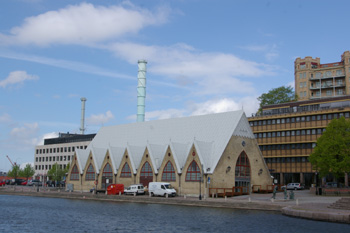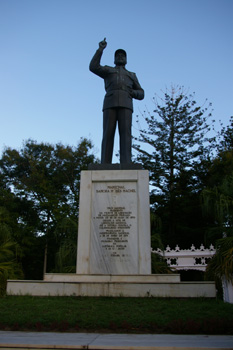We are developing the social individualist meta-context for the future. From the very serious to the extremely frivolous... lets see what is on the mind of the Samizdata people.
Samizdata, derived from Samizdat /n. - a system of clandestine publication of banned literature in the USSR [Russ.,= self-publishing house]
|
Until recently, there was a shop named popXpress in Piccadilly near the Ritz hotel in London. This was a little store devoted entirely to selling Apple iPods and iPod accessories. When it was opened, people who analyse this sort of thing found it an interesting experiment, but were not terribly optimistic about its success, at least partly because it was situated only a short walk from the London flagship Apple Store in Regent Street. Higher hopes were held for the other popXpress store near Liverpool Street in the City of London, which was close to many cashed up City workers and far from an Apple Store. Thus it was not a terribly great surprise when parent company Computer Warehouse announced in March that the Piccadilly store was to close (the store in Liverpool Street remains open and quite possibly profitable). Upon learning this, most of us would have said “Oh”, and then gone back to sleep. However, the explanation, when it came, was stunning.
Next to the popXpress store in Piccadilly was and is a sushi bar, a branch of a chain named Itsu. This is what is known as a “fast casual” restaurant: a bit more expensive and with food a bit tastier than McDonald’s, but designed for people in a hurry or on their lunch breaks who want a quick meal and do not want to spend too much money. Itsu belongs to Pret a Manger, probably the king of London fast casual dining (and, incidentally, 30% owned by McDonald’s) . There are a couple of Itsu outlets near where I work in Canary Wharf, and from time to time I eat lunch in those outlets myself. The food is not bad, but it is not exactly worth writing home to Mum about either. I have never eaten at the branch in Piccadilly, and I suspect that few people who know the area do, because the (possibly Japanese government subsidised) Japan Centre at Piccadilly Circus is just down the road, and this manages to both be inexpensive and to serve some of the best Japanese food in London.
However, the Itsu restaurant in Piccadilly gained notoriety last November as the place where Alexander Litvinenko had lunch with his Italian acquaintance Mario Scaramella, where it was for a time believed he was poisoned and where traces of Polonium 210 were later discovered, leading to many radioactive sushi jokes.
As I mentioned, a couple of months after this, the popXpress store next door announced it was closing. Few would have thought there was a connection, but when asked, management explained that that had received “an offer they couldn’t refuse” from Itsu, who wanted to expand their store. Apparently, business had been absolutely booming since the Polonium 210 incident, and they wanted to expand the restaurant (no, I will not speculate as to why this offer could not be refused, and which if any isotopes were involved). Apparently Itsu also brought forward plans to open their first store in New York, as the publicity was apparently a godsend. It would seem that all publicity is good publicity, even when you are a change of restaurants and the publicity was that your food might be radioactive.
Actually, that may not be entirely true. Or at least it can be further tested. For come to think of it, another chain restaurant in London was in the news recently. At the Strand branch of pizza chain Zizzi, a man recently entered the restaurant at dinner time, obtained a knife from the kitchen, and used it to sever his own penis in front of diners.
Upon walking past that particular restaurant a couple of days later, I will confess that I was struck by a strong urge to walk in the opposite direction. Really, though, I should go in and ask management what the publicity has done for business. For I may want to take an interest in the business next door.
Guy Herbert this morning posted a piece commenting on Australian Prime Minister John Howard’s decision to “ban” the Australian cricket team from touring Zimbabwe later this year. I generally have little time for Mr Howard, but in this case I can not personally be very harsh on him. What clearly happened is that the Australian Cricket Board (which these days prefers to call itself “Cricket Australia”) begged him at length the make such an announcement, and he eventually gave in despite considerable resistance, and he did this because the alternatives open to him were probably worse. I have no disagreement with Guy that the outcome is essentially a dishonourable one, but the other easy options were worse. Some background.
In international cricket, there are only three countries for who the game is directly profitable. These are India, Australia, and England (in decreasing order of profitability). The other countries that regularly play international cricket make money by playing the national teams of these three countries, and then selling television rights and other sponsorship opportunities for these matches. Thus it is very important to (say) Sri Lanka for (in particular) India and Australia to regularly tour Sri Lanka and play matches.
In order to assure its members of some sort of regular cricket and regular income, the International Cricket Council (ICC) has in recent years created a mandatory tour program, requiring each of its members to play each other both home and away over a five year period. Reactions to this rule have varied, and compliance with it has been variable. The rule allows two sides to postpone a series if both are in agreement, which has allowed India and Australia to at times get their way by offering more money or more matches if the matches are played at some undefined “later”. However, if a team takes a hard line, then (at least theoretically) the other side must tour, or must pay a fine to the ICC which will be then forwarded to the host team as compensation for the lost revenues from the matches that were to have been played. The ICC’s rules allow for two situations in which a fine is not payable: firstly in cases where there is a genuine issue of safety – tours of both Sri Lanka and Pakistan have been called off for this reason in times of high political tension and terrorist threat – and in cases where a government forbids a tour. This second rule has come into play more in cases where Zimbabwe were potentially the touring side, most notably when Zimbabwean players were refused visas by the government of New Zealand.
Zimbabwe are a full member of the ICC. In the mid 1990s Zimbabwe had quite a decent cricket team (of mostly but certainly not entirely white players) but in the years since then Zimbabwean cricket has gone the way of most other things in Zimbabwe. At the demand of the government, white players were pushed out of the team, as were any non-white players who dared to say anything critical of the government. Officials who ran the game and actually cared about cricket were replaced with compliant government yes-men. The organisation of cricket in Zimbabwe became a shambles, and we are not sure right now to what extent the domestic cricket is even taking place. (The Association of Cricket Statisticians and Historians has recently been complaining about being unable to get scorecards for the domestic Logan Cup, which it has documented with no trouble for over a century). Inevitably, the standard of the national team has dropped from “decent, but not world beating”, to utterly woeful. Their performance in the recently completed World Cup was dreadful, and they have dropped to 11th in the world rankings, way behind the rapidly improving Bangladesh, and behind even Ireland, a side just consisting of part time Australian and English expatriates and who are not a full member of the ICC.
However, through all this Zimbabwe has maintained its full membership of the ICC. Zimbabwe has been “temporarily suspended” from playing test matches due to its declining standards, but it is still playing one day international cricket, and other teams are expected to tour in order to play these games. Australia was scheduled to tour Zimbabwe this year.
The obvious thing to do would be to expel Zimbabwe from the ICC, not necessarily on political grounds explicitly, but simply because cricket in Zimbabwe is no longer being administered and organised properly, that the board is no longer independent of government, and because selections are no longer taking place on the basis of merit. However, there are two reasons why this has not happened. The first is that there is a “third world” versus “first world” divide in international cricket, and some aspects of the administration of the game are a post-colonial nightmare. For many years Australia and England (and, prior to their expulsion from international cricket in the apartheid days, South Africa) had the right of veto over any decisions made in the ICC, and the other countries still have a lingering resentment of this. Once this veto was abolished, the Asian cricketing powers were eager to elevate other countries to membership of the ICC so as to gain a voting majority against the former “colonial” powers, and this is one factor that led to the elevation of Zimbabwe in the first place. Expelling Zimbabwe would increase the voting power of the “first world” bloc, and many people in India, Pakistan, and Sri Lanka do not want this.
Secondly, what are the objections to Zimbabwe playing international cricket? For one thing, Zimbabwe is ruled by a dictatorship that restricts civil liberties. Well, other members of the ICC include Bangladesh and Pakistan, who are not exactly wonderful on this score either. South Africa is ruled by people who consider Robert Mugabe to be one of their old comrades in arms. If Zimbabwe were kicked out of world cricket on these grounds, then this would “set a bad example” to Pakistan and Bangladesh in particular. Did I mention that the governing body of cricket in Pakistan is traditionally a branch of the army and the head of its board is usually a general? That complicates matters further, and rules out the “We should expel Zimbabwe because the government controls cricket in the country” argument. The government of Sri Lanka appoints that nation’s cricket board too (although not through the army). As for “Zimbabwe selects players on something other than merit”, well, South Africa does that too. (Affirmative action with respect to black and coloured players). One would think that “Zimbabwe should be expelled because Zimbabwean cricket is a shambles” might be enough, but the organisation of cricket in a number of countries is a shambles (most notably Pakistan again, also (sadly) the West Indies). The ICC is also a shambles, having demonstrated in its organisation of the recently completed World Cup that it is an organisation that could not collectively get pissed in Porto)
Australia was scheduled to tour Zimbabwe later this year. The Australian players did not want to make the tour. The Australian government definitely did not want the tour to go ahead. → Continue reading: On cricket, Zimbabwe, John Howard, the ICC, Pakistan and Bob Woolmer
I took this photograph this morning in Gothenburg, Sweden. Is the building in the foreground:
(a) an electrical power station;
(b) a fish market;
(c) a church; or
(d) a sewing machine factory?
The building still performs the function for which it was originally built. Answers on a postcard please.
Really, if The Economist is going to opine on this sort of thing, its writers need to know something on the subject.
– Glenn Reynolds
I love the Far East. And hey, this may be my all time most crass post to Samizdata.
One of my lesser vices is that I take a certain childish delight in unexpectedly arriving at a party when all the other guests think I am on a different continent, or unexpectedly posting to Samizdata from Maputo. In truth, I am thinking that the “blogging from unexpected places” technique is getting a little tired. In addition, it often leads to my getting messages three days later from people who I might have wanted to meet, saying that if they had known I was in town they might have liked to have bought me a drink or shown me some interesting part of town I was not aware of. Therefore, let me do something a little different.
I will be in Paris from the 6th to the 10th of April – the Easter weekend from Friday morning to Monday evening. Does anybody want to get together for a Samizdata drinks session, or perhaps we could go out for dinner? The evening of Saturday April 7 might be good for it.
Secondly, does anybody know of a bar or pub in Paris that is showing the matches of the cricket World Cup live? In particular, I would like to watch at least some of the Australia v England game this is being played on April 8, Easter Sunday. Help on this matter would be appreciated.
In the “really long term planning” stakes, I will be in Singapore on Thursday December 20. If anyone wants to do an Asian Samizdata dinner that evening, that would also be a splendid thing.
And of course I shall be in many other places at various times in between.
When I decided that I would blog the cricket World Cup in detail, I thought I would be reporting on cricket matches. Right now, I should be sitting in a pub watching Australia play South Africa, the biggest game for my team so far. However, I am at my computer writing at length about peculiar historical events. When I started I thought I was writing the following piece for my own blog. However, as it went on, I realised I was writing a background piece to what was being discussed (as much in the comments as the article, and as much by myself as by Brian) in Brian’s piece on Bob Woolmer’s murder yesterday. The piece starts with some history, but this is crucial to understand the weird and pathological events of the game today, if indeed they can be understood.
For Samizdata readers, there is one point that I sort of assume knowledge of, but which may not be obvious to people who do not follow cricket. I get to it at the end of the post, but I may as well emphasise it now. Cricket has an odd structure, which stems from a century in which it was unable to decide if it were an amateur or professional game. Cricket is today a professional game, but the principal professional teams are national representative teams, which play together all year long. Australians must play for Australia, Indians for India, Englishmen for England. If a player falls out with management, that can end a career, whereas in baseball or soccer he would simply find another team. This also means that if a very good player has the misfortune to come from a small poor country, he will not make nearly as much money as an equally good player from a larger or richer country. It also means that a quite good player who comes from a country with a strong team might not get much of a professional career, whereas the same player would easily do so if he came from a country with a weaker team. It also is partly responsible for the fact that playing strength, expertise in the game, money, and good governance are all too be found in different countries. These imbalances are one thing that makes the game as prone to corruption and criminality as it now seems to be.
In soccer, the World Cup is played between teams of players who spend most of their time (and make most of their income) playing for clubs. In cricket, it is played between the same teams who play together for the rest of the year.
In 1983, India unexpectedly won the World Cup in England. This was a huge event for India, and it led to India and Pakistan asking for and gaining the right to host the 1987 World Cup. This was a big thing for the cricket World Cup, as it had been a largely English event (hosted by England, under English local playing conditions) until that point. The 1987 event ended up on the subcontinent at least partly because the England board had to some extent lost interest, and they were not too bothered by somebody else taking it off their hands. (It was not too long later that the cricketing boards of the world – including England – started arguing bitterly over the right to host it – but interest in it was limited at that point).
India followed up the 1983 win with a win in the seven nation World Championship of cricket, held in Australia in 1985 to celebrate the 150th anniversary of the state of Victoria (or some such excuse). At the time, this event was not regarded as much less than a World Cup (which was, as I said, England’s event) – the key thing is that all seven test playing countries were participating. That 1983 win had something that the Australian organisers would not have preferred but which must have gone down well on the subcontinent – an India v Pakistan final, won by India.
Thus India in Pakistan went into the 1987 event believing that they were the teams to beat, and that the event represented a coming of age for subcontinental cricket. The two teams did indeed play well, topping the points tables in the two groups, and each playing home semi-finals. The expectation of everyone was that India and Pakistan would meet in the final.
This did not happen. Australia and England each won their respective semi-finals and met in the final, with Australia winning the tournament. (Expectations in Australia were so low that nobody had even purchased the television rights to the tournament until midway through it – and then after Channel Nine did so, it did not bother to show any of the semi-finals live, and then chose to show a movie rather than the second (England) innings of the final. Australians did not get to see Australia’s first World Cup victory on live television). Some people in India compared the final to a wedding without the bridge and groom. The event was in truth a huge success, and probably the first major subcontinental media saturating cricket event, of a type we have had many of since. The victory by Australia seemed to many to be a complete fluke at the time, but looking from 2007 it seems almost fated – the first of a great many Australian victories that have filled the last 20 years. I remember reading in an English newspaper a couple of months after the event that gave no credit to Australia whatsoever, blamed the victory mostly on Mike Gatting’s reverse sweep, and that it was a game that “England would have won nine times out of ten”. You cannot imagine an English commentator saying that about England v Australia matches these days, but that kind of attitude might help to explain why we still enjoy beating England so much. 1987 was also probably the time when the curious inability of home sides to win the World Cup started to become clear. Nobody had expected England to win any of the three previous tournaments in England, and England did actually do well enough, especially in 1979. However, India and Pakistan could not do it in 1987, and then Australia could not even make the semi-finals despite being pre-tournament favourites in 1992.
But as I was saying, 1987 was the first big subcontinental cricketing media event. → Continue reading: Some background to the Woolmer affair: how did cricket get here?
Freddie could have drowned out there
An anonymous source at the Rex St Lucian hotel in St Lucia, discussing the fact that England’s cricket vice-captain Andrew Flintoff celebrated England’s stunning first up World Cup loss to New Zealand (in which Flintoff was out first ball) by having an eight hour bender, commandeering and then capisizing a small boat and having to be rescued at sea at 4am.
Regardless of the England heroics the World Cup has turned out to be a fascinating event so far, with Bangladesh possibly announcing their coming of age in international cricket with a stunning victory over India, and Ireland celebrating St Patrick’s Day by knocking former champions Pakistan out of the tournament with a rather mind-boggling win. Personally I think another upset is on the cards today. England are capable of beating Canada.
The ninth cricket World Cup commenced today, As I write this, the West Indies are playing Pakistan in Jamaica. Sixteen teams will play a total of 51 games between now and the final in Barbados on April 28. My recently neglected personal blog shall be turning into World Cup Central for the next seven week. I shall be blogging every match, and fellow Samizdatistas Scott Wickstein, Brian Micklethwait, Philip Chaston and Jonathan Pearce shall be joining me as guest bloggers for the duration of the tournament. As well as match commentary there shall be analysis of the teams, the format, the points system, the politics of the International Cricket Council, the cricketing cultures of the participating nations, and whatever else comes to mind. I did this also four years ago: people who are interested might want to look here (and scroll down). However, wheras four years ago there was a lot else on the blog as well, this time it is going to be mostly or entirely cricket.
However, a brief primer for the tournament.
- The World Cup is a one day cricket tournament. This form of the game was invented in the mid 1960s in England, and has been played internationally since 1971. The traditional form of the game is played over five days. Whereas in test cricket each team bats twice and there is no limit as to how long each can bat for (other than the time limit of the game), in one day cricket each team is allowed to bat for a maximum of 50 overs (300 balls) and is only allowed to bat once. This means that the game takes a total of seven hours playing time. One day games often start mid afternoon and are played (under lights) until about 10pm. Players in one day matches wear coloured uniforms and play with a whilte ball. Traditional test cricket is played with both teams wearing white and with a red ball. The more serious a cricket fan, the more he is likely to prefer traditional five day test cricket to one day cricket, particularly if he is Australian or English. Australians would probably rather win the Ashes than win the World Cup. (Australians certainly hate losing the Asehs more than losing the World Cup). On the other hand, if India win it will will be a huge event for more than a billion people. If India make the final, the entire Bollywood entertainment industry will decamp to Barbados in the hope that some of the glamour of the victory will rub of on them if India win the tournament. (This happened when India made the final in Johannesburg four years ago, but alas for them, India did not win).
- One day cricket in recent times has been dominated by batsmen, with scores of 300 or even 400 runs becoming more and more frequent. The conditions in the West Indies should suit the bowlers more than has recently been the case in Australia, New Zealand, or South Africa. This means the strong batting sides (Australia, South Africa, India) make find themselves brought back to the pack by sides with canny bowling and clever tactics. This may favour sides such as New Zealand, Pakistan, Sri Lanka, and perhaps the West Indian hosts, none of who would not be favoured if the tournament was in South Africa. Conditions at times will also favour spin bowlers, which will make the tournament interesting, and may allow sides such as England and Sri Lanka to surprise a few of their opponents.
- There are 16 teams playing in this year’s tournament: West Indies; Pakistan; Australia; Sri Lanka; South Africa; England; New Zealand; India; Scotland; Canada; Kenya; Bermuda; Ireland; Zimbabwe; Netherlands; and Bangladesh. Only the first eight of these teams have an chance of winning the tournament. It is unimaginable that any of the other eight could win it. The tournament organisers know this, which is why the second round consists of eight teams and the first stage is relatively short. It is extremely unlikely that any of the second eight teams will make the second round. It is quite unlikely that any of the second eight teams will win a game against any of the first eight, although such events have occurred in previous tournaments. Previous World Cups have had formats in which the lesser nations have stayed in the tournament longer, and have had many one sided mismatches. However, there is very little between the eight first named sides. It would not be a huge surprise if any of the eight won the tournament. Going into the tournament, the World Cup seems one of the most open on record. This is completely unlike the last tournament, where Australia were obviously the best side from day one. (Their performance in winning eleven games straight in that tournament was awe inspiring, but it did not make for an exciting tournament
- At seven weeks and 51 games, the tournament seems endless. The two finalists will each play a total of eleven games. The reason for this is that television rights for the World Cup is the major source of income for the International Cricket Council, the sport’s governing body. The vast majoirty of other cricketing events make money for the sides participating and in particular the side that hosts them. When the ICC is making the money, they milk it for all it is worth.
- The World Cup has been played eight times before. Australia have won it three times (1987, 1999, and 2003), the West Indies twice (1975 and 1979), India (1983), Pakistan (1992) and Sri Lanka (1996) once each. The tournament has been hosted by England four times (1975, 1979, 1983, 1999), South Africa once (2003), India once (1987, with some games in Pakistan), Pakistan once (1996, with some games in India and Sri Lanka), and Australia once (with some games in New Zealand). No side has ever one the tournament at home, unless you count Sri Lanka in 1996. (They played all their important games away from home, so I personally do not). The tournament is being played in the West Indies for the first time.
- For team by team analysis, you have two choices. Either look below the fold, or head over to my blog. You will find the same in either case.
→ Continue reading: The cricket world cup: a primer and a brief plug
One of the sad things that happened in the cold war was that the two sides each found allies in the third world, and what was best for poor countries got lost in the global realpolitik. This was saddest in Africa, where in many cases the anti-colonial rhetoric of communism and the money and weapons provided by the Soviet Union (combined with the fact that many of the African colonial powers were American allies of one form or another) led to many countries embracing socialism. This was of course a catastrophe, in that pretty much without fail the countries that took the socialist road were impoverished by it, not to mention being involved in wars that could and should have probably been avoided. The socialist rhetoric is now largely gone, and most African countries are now more over-bureacratic and corrupt than particularly ideological. That said, the ideas live on in the minds of many of the people who were involved in African struggles. Listening to South African government officials talking about appropriating private propery is rather depression. One would hope that they could look north at Zimbabwe and see what is not the solution.
And it lives on in other ways. One way is in the names of streets in places like Maputo. I think it would be a good thing at this point to formally disavow certain aspects of the past. But there seems to be a certain lack of that kind of bravery.
 Tosser Tosser
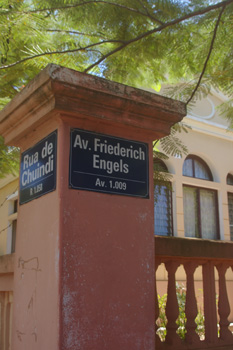
Tosser
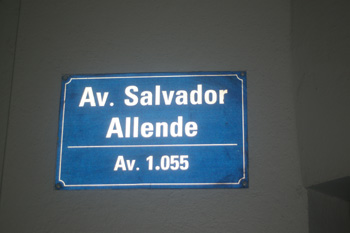
Tosser, although whether Pinochet was a bigger or smaller tosser is a matter for dispute
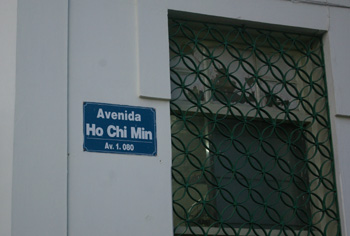
Tosser
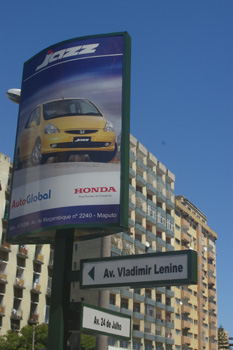
Big tosser, although I suppose we can at least say “Japanese car manufacturers 1. Soviet Union 0”

Well, okay, he was at least another African independence leader, and his country has at least managed to remain peaceful, which is more than many can say. He did utterly impoverish it, just the same. Could be worse
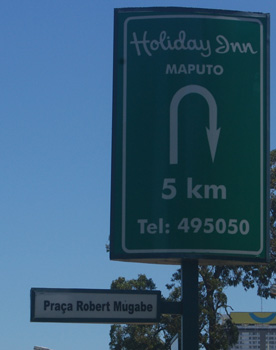
Much worse, in fact.
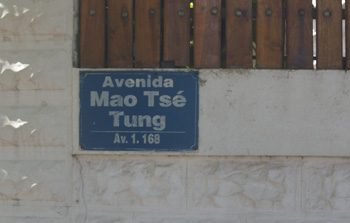
Perhaps we could also have streets named after Hitler and Stalin so that the three great murderers of the 20th century all get equal treatment?
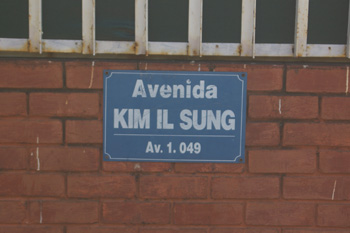
Okay, at this point I think we may have reached the indescribable
There is perhaps one redeeming feature, however. Near the botanic gardens is to be found a statue of Samora Machel, the first post-independence president of Mozambique. As it happens, this statue was given to Mozambique by the North Koreans and Kim Il Sung, which perhaps explains the slightly wacky style.
However, the statue hasn’t received much maintenance, and many of the words on the plaque below it have crumbled away. In particular, the whole section explaining when and how the statue was erected is gone, and there appears to have been no attempt to repair the sign and return Mr Kim’s credit. That is something to be thankful of, I suppose.
I am still in Mozambique, although I shall be getting on a plane to Johannesburg in a few hours, and then another to London right after that. My trip has been a very brief one. I came to Johannesburg for a friend’s wedding, and (partly drivern my great love of things Portuguese) then spent a few days in Mozabique after that. It has been well worth it. (However, upon meeting some members of the South African branch of the Jennings family, I did have to turn down an invitation to visit them at their private game lodge as I had already booked the trip to Mozambique. That was a shame).
I have had a fascinating and enjoyable time, although I have only been able to look at a small area in the south of the country: Maputo, the Ilha da Inhaca, and Catembe. I now know that some day I really must see the Ilha da Mozambique.
Of course, what I would really like to do now is take another couple of weeks, and work my way up the entire length of Mozambique to Malawi and Tanzania. But of course, I do not have time, and in fact in theory I am going to work in London tomorrow. (Who am I kidding? What I would really like to do is take three months, and work my way all the way to Cairo).
So I don’t think it will be long before I visit Africa again. I have lots more to write, but that can wait until I am back in London.
|
Who Are We? The Samizdata people are a bunch of sinister and heavily armed globalist illuminati who seek to infect the entire world with the values of personal liberty and several property. Amongst our many crimes is a sense of humour and the intermittent use of British spelling.
We are also a varied group made up of social individualists, classical liberals, whigs, libertarians, extropians, futurists, ‘Porcupines’, Karl Popper fetishists, recovering neo-conservatives, crazed Ayn Rand worshipers, over-caffeinated Virginia Postrel devotees, witty Frédéric Bastiat wannabes, cypherpunks, minarchists, kritarchists and wild-eyed anarcho-capitalists from Britain, North America, Australia and Europe.
|
